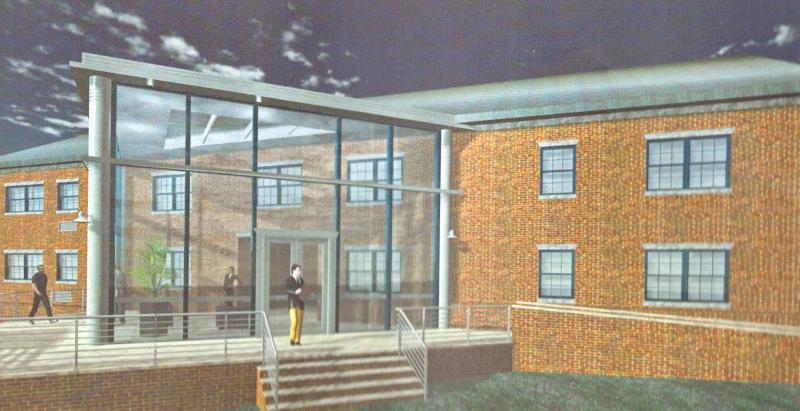Town Meeting members to weigh in on police station
Town Meeting will address slight raises for some town workers and another go at the lighting bylaw, but perhaps the most buzzed about item on the 20-article warrant is the rehabilitation and renovations to be made to the police station.
On Oct. 20, Town Meeting members will decide whether or not the town can borrow $8.4 million for that purpose.
The vote in October will be contingent on voters approving a debt exclusion through the tax-limiting Proposition 2½. If Town Meeting members vote in favor of the project, the vote on the debt exclusion will occur in April.
The station on 249 Russells Mills Road was closed in 2014 when the bacterium legionella was found in the hot water system after an officer became ill with Legionnaires’ disease. Since then, the department has operated out of a modular building located on the property.
Back in July, the Police Station Building Committee presented three possible solutions to the Select Board. One option would simply correct the problems at the station at the cost of $6 million. Another option, costing $14 million, would have involved building a new station at the site of the Gidley School in North Dartmouth.
Members of the Select Board ultimately recommended the Police Building Committee-approved option, which would gut and renovate the existing facility. The $8.4 million project would also include a garage with a training facility. The project would cost the average residential taxpayer about $39 a year in additional taxes for the next 20 years.
The four members of the Select Board authored a letter to Town Meeting members in which they provide a list of reasons why they think the renovation and rehabilitation project is the best choice.
The board wrote that the renovated facility can be used for the next 30 to 40 years because it’s designed for a larger police force and will address all the issues from the $6 million option. The letter also addresses the somewhat contentious glass lobby designed for the front of the building.
“…This is an issue that is not settled and will be discussed further as the project goes through its final design,” the letter reads.
Select Board member Frank Gracie said he’s heard concerns from the public about the glass front.
“I want the front of the police station to be warm and welcoming. I don’t see where the glass front helps that,” said Gracie. “As a retired engineer, I have concerns about the heating and cooling costs.”
Gracie said another common concern from the public is the changing cost of the project. In early summer, the projected cost was $7.3 million but was later updated to $8 million.
“I talked to [Treasurer] Greg Barnes, and he reminded me that every bid we’ve put out lately has come back higher than we’ve expected due to construction costs rising,” said Gracie.
He said the increase provides a buffer in case of any cost increases. During a Select Board meeting last month, the final estimate came in at $8.4 million. The additional $400,000 stemmed from a recommendation by the Finance Committee that the five-bay garage, which was part of the original estimate, include an addition for a training center and physical fitness center.
The addition would mean the police force wouldn’t have to use the modular building for training purposes.
Architect Allen Lieb also wrote a letter to Town Meeting members explaining that the price increase was due to the addition and the ever-rising cost of materials.
Lieb wrote that construction “will not be able to begin until the end of October 2016 due to the exclusion vote and the time it takes to prepare construction documents.” Labor and material costs will increase during that one-year delay, he wrote.
The warrant also asks Town Meeting members to weigh in on wages of some town workers. To help Dartmouth stay competitive in the region, the Parks and Recreation Department looked at wages for some of its workers.
Life guards would see a raise from $12 to $13 an hour, the life guard supervisor would move from $14 to $15 an hour, trucker drivers' pay would increase from $14 to $15 an hour and general laborers, who handle general maintenance, would increase from $9 to $12 an hour.
The warrant will also address the lighting bylaw, which was previously addressed during June’s Town Meeting. The bylaw was designed as an attempt to fight back against light pollution and reduce the chance of overly bright lights from distracting drivers.
Amendments to the bylaw were introduced at Town Meeting, confusing those present and raising concerns that members were drafting a law at the meeting. Town Meeting members ultimately voted against the amendments and the main article.
A committee was formed over the summer to work on the language of the law, and the updated version of the bylaw has been added to the warrant.
The scope of the bylaw has been limited to window accent lighting, which is defined as any “single, or assembly of, incandescent, fluorescent or LED lighting element or elements” located in a window, viewable from the exterior of the building.
Lights affected by the bylaw would have to be more than 150 foot candles, a measurement of light, at the source when read by a light meter.
“It’s not to pick on any one business, it’s more about safety,” said Select Board member Stanley Mickelson. “There’s enough distraction for drivers today.”













